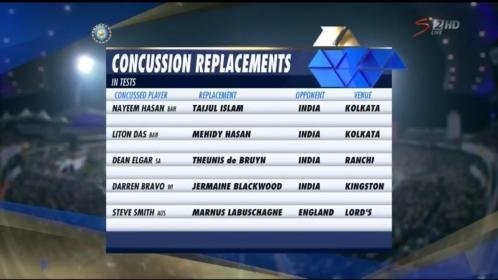Donal Cozzie
ODI Debutant
- Joined
- Dec 30, 2013
- Runs
- 9,541
- Post of the Week
- 4
Increasingly in the last few years we are seeing medical reports into sports such as rugby and NFL, and entertainment such as WWE, cast a damning indictment on how those sports/federations treated concussion. Players being encouraged to play on, the injury not being taken seriously etc leading to players in later years developing serious health issues and in some cases even dying prematurely.
This isnt just for those sports, football now has taken on an increased sense of responsibility in this regard. As an example, Mo Salah missed Liverpools crucial Champions League semi final second leg due to a concussion he had sustained a full week before in order to give him time to rest.
In light of this, I find it odd that a) Amla in an earlier game, after being shaken up so badly he had to retire hurt, was allowed return to the crease and bat, despite the injury being so severe he had to miss training the following days.
Today, even more concerning, Hashmatullah Shahidi, after being floored by a bouncer and play being stopped for several minutes, batted on anyway against the medical advice as he "didnt want to leave his teammates". While that is admirable, surely player health should take preference and potentially a substitute batsman allowed rather than risking an already potentially (and likely) concussed cricketer potentially receiving another serious blow and, potentially, a serious injury, by batting on?
In football a star player had to sit out over a week to ensure he recovered fully. Meanwhile in cricket players who exhibit signs of concussion return to bat and then play more games days later when the medical advice on this injury is typically for a player to sit out for several days if not longer?
Is cricket sorely lacking in this regard and are we potentially going to see serious injury? Every other sport is raising awareness in this regard, in light of the shocking post career injuries of certain sportspeople.
This isnt just for those sports, football now has taken on an increased sense of responsibility in this regard. As an example, Mo Salah missed Liverpools crucial Champions League semi final second leg due to a concussion he had sustained a full week before in order to give him time to rest.
In light of this, I find it odd that a) Amla in an earlier game, after being shaken up so badly he had to retire hurt, was allowed return to the crease and bat, despite the injury being so severe he had to miss training the following days.
Today, even more concerning, Hashmatullah Shahidi, after being floored by a bouncer and play being stopped for several minutes, batted on anyway against the medical advice as he "didnt want to leave his teammates". While that is admirable, surely player health should take preference and potentially a substitute batsman allowed rather than risking an already potentially (and likely) concussed cricketer potentially receiving another serious blow and, potentially, a serious injury, by batting on?
In football a star player had to sit out over a week to ensure he recovered fully. Meanwhile in cricket players who exhibit signs of concussion return to bat and then play more games days later when the medical advice on this injury is typically for a player to sit out for several days if not longer?
Is cricket sorely lacking in this regard and are we potentially going to see serious injury? Every other sport is raising awareness in this regard, in light of the shocking post career injuries of certain sportspeople.






